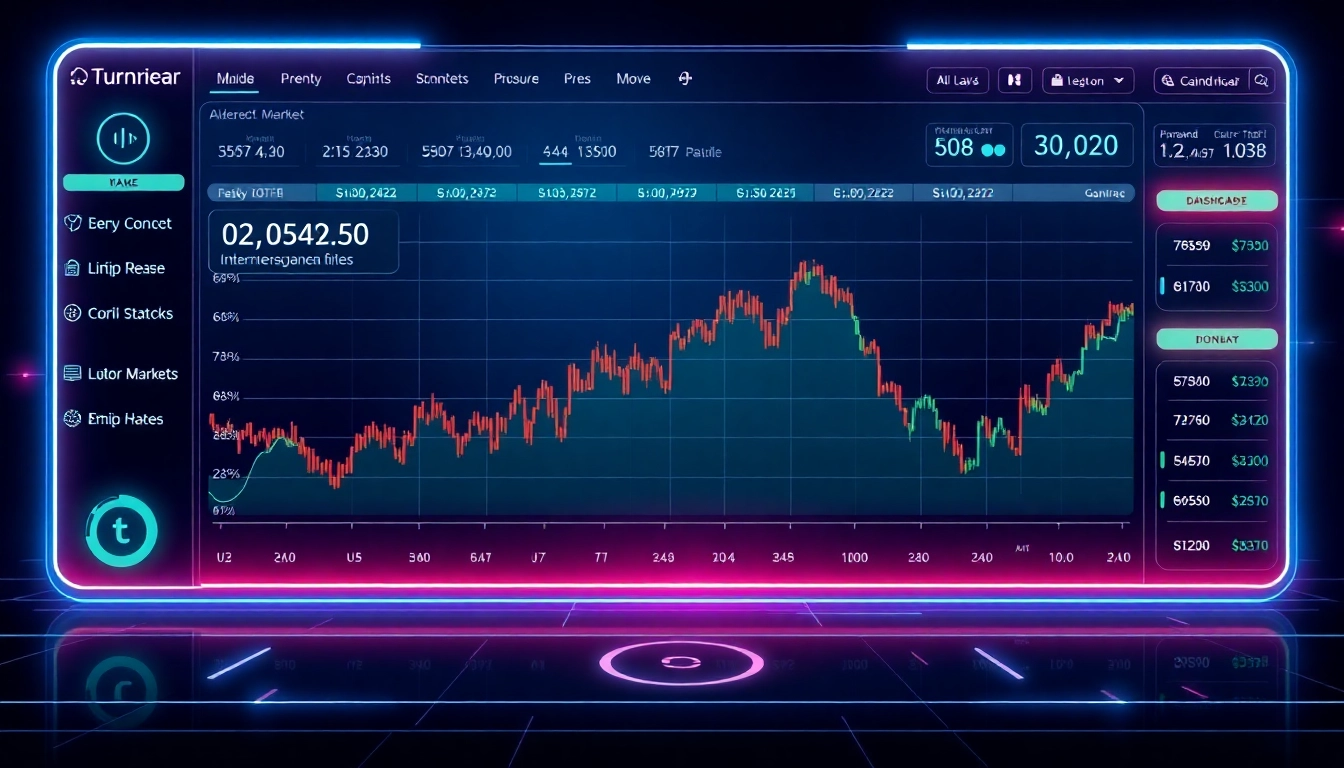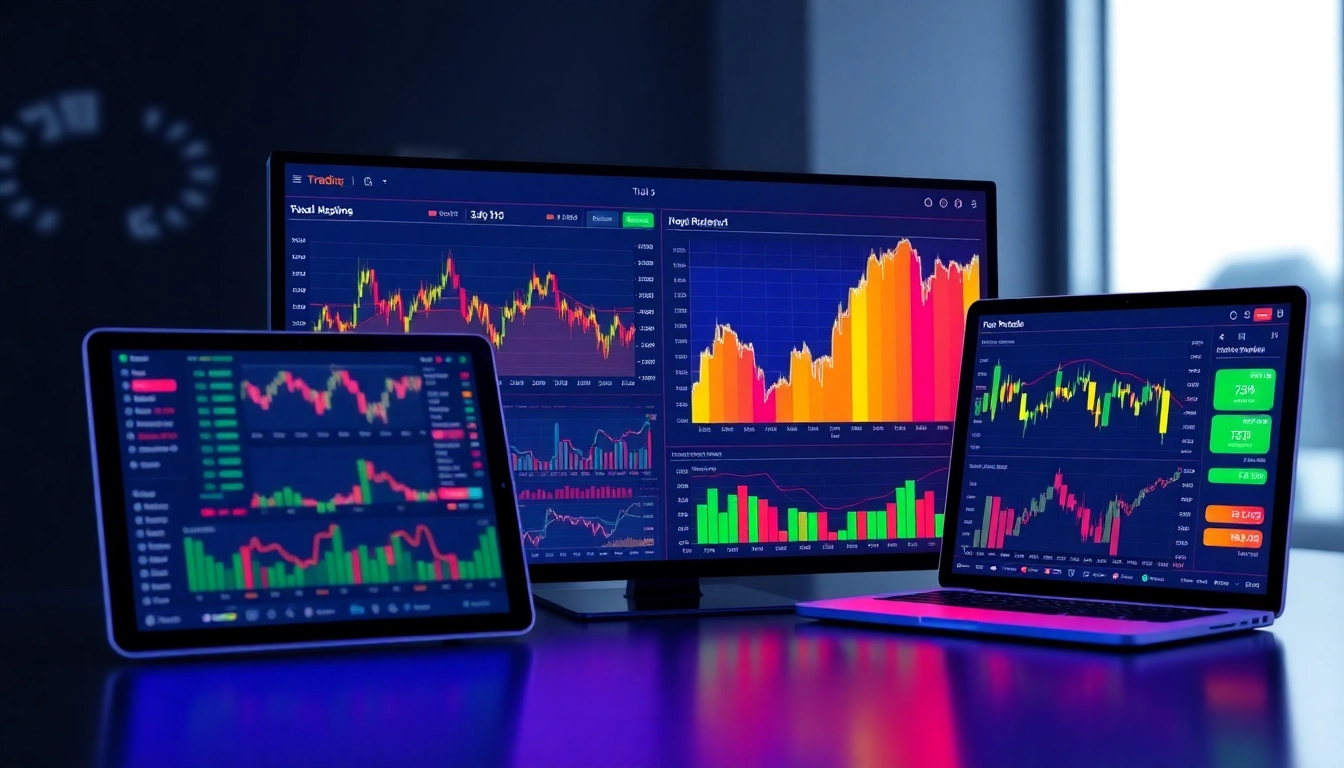Introduction to Online Trading UK: Understanding the Market Landscape
In recent years, online trading has transformed from a niche activity into a mainstream investment avenue accessible to individuals across the UK. With technological advancements, regulatory protections, and an expanding variety of trading platforms, the UK market offers a dynamic environment for both novice and experienced traders. Engaging in online trading allows investors to buy and sell a diverse array of assets such as stocks, ETFs, forex, commodities, and cryptocurrencies, often with real-time data, analytical tools, and swift execution capabilities. To truly understand the scope and potential of online trading in the UK, it is essential to explore how the market operates, the opportunities it presents, and the steps to begin trading confidently and securely.
For newcomers contemplating their entry into the UK trading scene, learning about the nuances of the market is vital. As an example, Online Trading UK provides a comprehensive starting point that covers regulations, platform choices, and strategic considerations. Navigating this landscape requires not only understanding the mechanics but also staying informed about current trends, technological tools, and regulatory frameworks that safeguard investments and promote fair trading practices.
What Is Online Trading and How Does It Work?
Online trading refers to the process of buying and selling financial instruments through digital platforms via the internet. Unlike traditional trading, which often involved physical proximity to a broker or trading floor, online trading democratizes access, empowering individuals to participate from their homes or offices. The core components of online trading include trading platforms, brokerage accounts, real-time market data, and analytical tools.
Once a trader opens an account with a reputable UK broker, they can access various markets — such as the London Stock Exchange for equities or global forex markets for currency trading. These platforms execute trades electronically, provide live pricing updates, allow for technical and fundamental analysis, and often incorporate educational resources. Trades are executed within seconds, with confirmation messages guiding traders through each transaction.
Most UK platforms operate using mechanisms like order matching, limit orders, and stop-loss orders to implement trading strategies efficiently. For example, a trader might place a limit order to buy a stock at a specific price, ensuring they only purchase if the market reaches their target. This automation, combined with high-speed connectivity and integrated analytics, allows traders to respond swiftly to market movements, which is critical for strategies like day trading or volatility trading.
Current Trends and Opportunities in UK Markets
The UK financial markets are consistently evolving, influenced by technological innovation, regulatory adjustments, and geopolitical factors. In 2025, some notable trends include the surge in commission-free trading, increased popularity of fractional investing, and the growth of social trading platforms like eToro, where traders can copy top investors’ strategies.
Additionally, the expansion of ESG (Environmental, Social, and Governance) investing has prompted brokers to offer green ETFs and responsible investing options, aligning with the growing demand for sustainable assets. The rise of cryptocurrency trading, despite regulatory challenges, presents another lucrative avenue reflecting investor appetite for digital assets.
Opportunities abound for traders skilled in technical analysis, fundamental research, and macroeconomic awareness. For instance, during Brexit-related negotiations, market volatility created aggressive trading opportunities, especially for day traders leveraging short-term price swings. Conversely, long-term investors capitalize on stable growth trajectories of certain UK and global corporations.
Key Benefits of Trading Online in the UK
- Accessibility: Clear regulatory frameworks and widespread technological infrastructure make online trading accessible to almost anyone with an internet connection.
- Cost-Effectiveness: Many UK brokers now offer commission-free trading on stocks and ETFs, reducing the barriers to entry for retail investors.
- Market Diversity: Investors gain access to UK and international markets, broadening investment options beyond domestic stocks and bonds.
- Real-Time Data & Tools: Advanced analytical tools, live market feeds, and customizable dashboards foster informed decision-making.
- Educational Resources: Many platforms provide tutorials, webinars, and demo accounts to help traders develop essential skills without risking real capital.
These benefits demonstrate how online trading not only democratizes investment but also enhances trading efficiency and strategic depth, positioning UK traders to capitalize on the latest market developments.
Choosing the Right Online Trading Platform in the UK
Top Features to Look for in UK Trading Platforms
When selecting a trading platform, key considerations include user interface intuitiveness, platform stability, range of tradable assets, research and analysis tools, and customer support. Security features such as two-factor authentication and segregated client accounts are crucial for safeguarding funds. Compatibility with mobile devices and desktop systems ensures flexibility, while transparent fee structures avoid unexpected costs that can eat into profits.
Comparison of Leading UK Online Brokers
Based on recent market analyses ([see comprehensive reviews](https://uk.stockbrokers.com/guides/share-dealing-accounts)), top UK brokers include companies like Saxo Bank, IG, Trading 212, and Interactive Brokers. Saxo Bank excels with a professional-grade platform suitable for active traders, and IG is renowned for its robust research tools and market coverage. Trading 212 is particularly popular among beginners due to its user-friendly interface and fractional investing options, while Interactive Brokers offers advanced features geared toward professional traders.
How to Select the Best Platform for Your Trading Goals
Identify your investment style and objectives — whether it is short-term trading, long-term investing, or a mix. For active traders needing sophisticated tools, platforms like Saxo or Interactive Brokers might be ideal. For beginners, Freetrade or eToro provide simplified interfaces. Consider trading costs, available assets, and educational support. A trial demo account can help assess platform usability and features before committing real capital.
Essential Skills and Tools for Successful UK Traders
Technical Analysis and Market Indicators
Proficiency in technical analysis involves understanding chart patterns, trend lines, and indicators such as moving averages, RSI, MACD, and Bollinger Bands. These tools help predict short-term price movements and identify entry and exit points. For example, a trader observing RSI divergence might anticipate a change in trend, enabling timely trades.
Risk Management Techniques for UK Markets
Implementing stop-loss orders, position sizing, and diversification are vital to reducing downside risk. Understanding market volatility and setting appropriate expiry or limit levels prevents significant capital losses. Regularly reviewing risk-reward ratios ensures that potential gains justify associated risks, especially during high-volatility periods like economic data releases or geopolitical events.
Trading Software and Analytics Tools
Advanced platforms offer features like algorithmic trading, custom scripting, and integrated news feeds. Tools like MetaTrader, TradingView, or broker-native platforms provide backtesting capabilities and real-time alerts. Employing these tools streamlines decision-making and enhances accuracy, a necessity for effective trading in fast-paced UK markets.
Strategies for Profitable Online Trading in the UK
Day Trading, Swing Trading, and Long-Term Investing
Adopt strategies aligned with your risk appetite and time commitment. Day trading involves executing multiple trades within a single day to capitalize on intraday price swings, requiring quick decision-making and risk controls. Swing trading targets holding assets for days or weeks, leveraging technical signals. Long-term investing emphasizes fundamental analysis, aiming for steady growth over months or years, perfect for those less inclined to frequent trading.
Leveraging News and Market Data for Better Decisions
Economic calendars, political developments, and corporate earnings reports are critical data points. For example, Brexit negotiations or UK GDP releases can cause market volatility, offering opportunities for informed traders. Real-time news feeds and analytical dashboards help traders anticipate and react to such events proactively.
Developing a Personal Trading Plan and Discipline
A solid trading plan defines entry/exit rules, risk management techniques, and profit objectives. Discipline in adhering to this plan prevents impulsive decisions driven by emotions or market noise. Regular performance reviews and journaling trades foster continual improvement and adaptability, essential traits for sustained profitability.
Regulatory Environment and Safety in UK Online Trading
Understanding UK Financial Regulations and Protections
The UK’s Financial Conduct Authority (FCA) ensures that brokers comply with rigorous standards, providing investor protection schemes such as the Financial Services Compensation Scheme (FSCS), which covers certain trading account holdings up to a specified limit. Choosing FCA-regulated brokers offers peace of mind via regulatory oversight, complaint procedures, and financial safeguards.
Avoiding Common Trading Pitfalls and Scams
Beware of unregulated brokers, high-pressure sales tactics, and scam trading signals. Verify broker credentials, read reviews, and ensure transparent fee structures. Avoid leveraging excessively or chasing dubious quick riches, as these often lead to significant losses. Educate yourself on fraud detection and report suspicious activities to authorities.
Resources for Staying Informed and Compliant
Stay updated with UK regulatory bodies’ announcements, join trading communities, and utilize educational platforms. LinkedIn, industry webinars, and official FCA resources offer insights and alerts pertinent to UK traders, helping them remain compliant and protect their investments.



